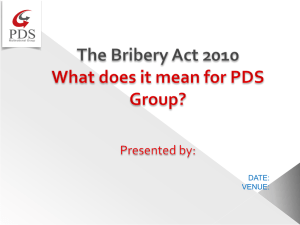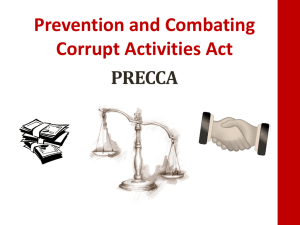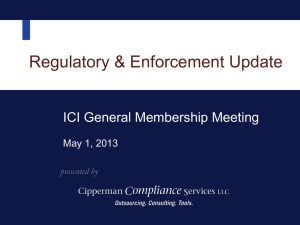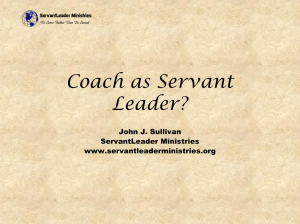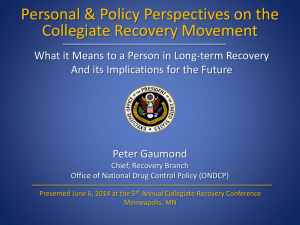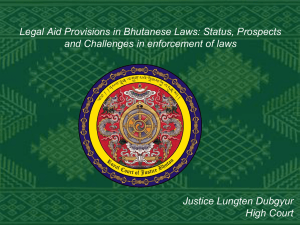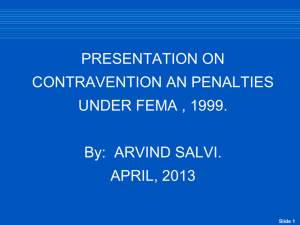ANTI CORRUPTION CASES - Press Information Welcomes you
advertisement
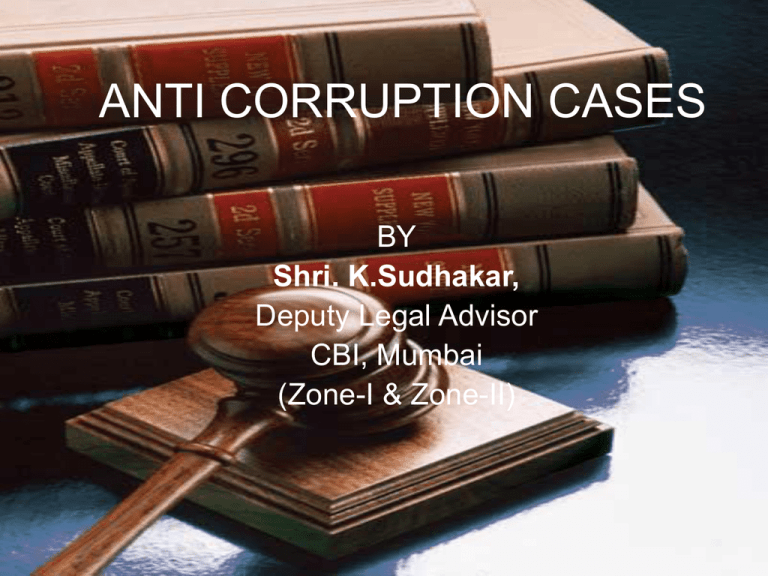
ANTI CORRUPTION CASES BY Shri. K.Sudhakar, Deputy Legal Advisor CBI, Mumbai (Zone-I & Zone-II) Need For Training Module The need for organizing ‘Training Module’ to meet the Press on the subject is felt to enrich the Media with the anti-corruption cases and its governing laws. Organizing Workshops and Training Module with the media is not new and earlier the Press Council of India in association with Hon’ble Supreme Court of India and National Legal Services Authority and Editors Guild of India organized workshops on the reporting of court proceedings by Media and Administration of Justice. Media has been recognized as “FOURTH ESTATE” , occupies very important and significant place in a Democracy along with Legislature, Executive and Judiciary. Freedom of Speech and Expression are recognized under Article-19 (1) (a) of the Indian Constitution subject to certain restrictions. Media is expected and obliged to work within the frame-work of the Constitution and other relevant Acts. The basic role of Media is to inform, educate and guide the society and it is a ‘Potent Organ’ of communication which can keep the society well informed about the violation of laws. We have witnessed that the Media has exposed powerful personalities stand before the law of the land. It is a matter of concern that at times, the Media has become more proactive by liberally commenting on the role of police in the investigation. Such actions of Media often influence the general public to believe the same and putting undue pressure on the course of fair investigation by the police. The end result is loss of public faith in police and investigating agency. Hence, the Media needs a vigilant reporting. The reporters of Media should have some basic knowledge about the cases which fall under the category of “Anti Corruption”. Hence, to enrich with the subject and to refresh with the Anti Corruption Law, this Training Module, Meet-The-Press is coined. EVOLUTION OF LAW INDIAN PENAL CODE was brought into force from 01.01.1862, though it received assent of Governor General of India on 6th October 1860. Indian Penal Code Chapter-IX deals with all offences by or relating to public servant. This Chapter does not deal with misconduct and abuse of power by the public servant. Section 161 to 165 of IPC deals with various offences of corruption and this is the first step to fight against corruption committed by the public servants. Section 161 of IPC deals with a public servant who accepts or obtains or agrees to accept from any person for himself or for any other person any gratification other than the legal remuneration. Section 162 of IPC deals with a person who accepts or obtains or agrees to accept or attempts to obtain for himself or for any other person any gratification by corrupt or illegal means to influence a public servant. Section 163 of IPC deals with a person who accepts or obtains or agrees to accept or attempts to obtain for himself or for any other person any gratification for inducing and by exercise of personal influence with any public servant. Section 164 of IPC deals with abetment of offence of sec.162 and 163 IPC. Section 165 of IPC deals with a public servant who accepts or obtains or agrees to accept or attempts to obtain for himself or for any other person any valuable thing without any consideration or less consideration. There was no offence till 1952 for abetment of any offence u/sec.161 or 165. Hence, in 1952, by way of Criminal Law Amendment, 165-A was inserted to make abettor of sec.161 or 165 of IPC as offenders. What amounts to a bribe? I. II. III. IV. The receiver must be a public servant. He must solicit or receive illegal gratification. He must have received the same as a motive or reward. It should be other than legal remuneration. Motive is for doing a future act. Reward is for a past act. Mere demand of bribe by a public servant is an offence u/sec. 161 IPC (Mubarak Ali v/s State AIR 1958 MP page-157). Gratification is not restricted to pecuniary gratification or estimable in money (C.I. Emden v/s State of UP AIR 1960 SC 548). During 2nd World War, there was large scale of corruption in War Dept. which necessitated for creation of a Special Police Establishment to curb corruption. Later the Special Police Establishment became the Central Bureau of Investigation. There was no special act for Prevention of Corruption till 11th March 1947. A Special Act i.e. Prevention of Corruption Act, 1947 came into existence from 11th March 1947 to make more effective provision for the prevention of bribery and corruption. By enacting the Special Act, in addition to IPC provisions (Sec.161 to 165) Criminal Misconduct was made as an offence as per Sec.5 of PC Act, 1947. Criminal Misconduct 1. 2. 3. If a public servant habitually accepts any bribe. This offence is aggravated form of 161 IPC. If a public servant habitually accepts any valuable thing without consideration or for less consideration with whom he transacted business or about to be transacted. It is aggravated form of sec. 165 IPC. Fraudulently misappropriates or converts for his own use any property entrusted to him or under his control or allows any other person. 4. 5. By corrupt and illegal means or otherwise by abusing his official position as public servant obtains any valuable thing or pecuniary advantage. Possession of Disproportionate Assets. To consolidate the law relating to the Prevention of Corruption, the old PC Act is repealed, and the provisions of Section 161 to 165-A IPC were also repealed by introducing PC Act, 1988 which came into effect from 09.09.1988. Under this Act, the provisions of IPC and the provisions of Sec. 5 of PC Act, 1947 were put together as under: S l. No. IP C P unish m e nt PC Act, 1947 P uni s hm e nt P C Act, 198 8 P unishm e nt 1 S e c. 161 3 ye a rs S e c.7 S ha ll not be le ss tha n six m onth s. m a y ex te nd to five ye a rs 2 S e c. 162 3 ye a rs S e c.8 S ha ll not be le ss tha n six m onth s. M a y ex te nd to five yea rs. 3 S e c. 163 S e c.9 S ha ll not be le ss tha n six m onth s. M a y ex te nt to five yea rs. 4 S e c. 164 3 ye a rs S e c.10 S ha ll not be le ss tha n six m onth s. M a y ex te nd to five yea rs. 5 S e c. 165 3 ye a rs S e c.11 S ha ll not be le ss tha n six m onth s. M a y ex te nd to five yea rs. 6 S e c. 165 A 3 ye a rs S e c. 12 S ha ll not be le ss tha n six m onth s. M a y ex te nd to five yea rs. Anti-Corruption can be basically divided into three categories. 1. 2. 3. bribery and its abettors. Abuse of official position Possession of disproportionate assets. Bribery and its Abettors Just as fish moving under water cannot possibly be found either as drinking or not drinking water.(Kautilya) Similarly, public servants cannot be found out while taking money. Sec. 7 of PC Act 1988 deals with public servant taking gratification other than legal remuneration. The public servant becomes functus officio when money offered to him as a bribe. Payment of a sum to a public servant whether paid before or after the act would constitute bribe (Mohinder Lal Bagai v/s Delhi Administration 1970 Cr LJ 793) The practice of laying traps employing spies and trap witnesses for detection of offences has been recognized in this country (In re Ambujam Ammal, AIR 1954 Madras 326). Sting operation by a private television channel for detection of crime was also accepted (Sri Bharadwaj Media Pvt. Ltd. v/s State 2008 (2) Crimes 244 Delhi). In this case, a telecast programme was shown from MPs receiving money for raising question in Parliament. The Delhi High Court observed that FIR could be quashed only if all facts stated when considered true did not disclose cognizable offence. Section 8 and 9 of PC Act are complimentary to sec.7 of the PC Act and are intended to reach to the aiders and abettors of the offence. Section 8 and 9 of the PC Act are applicable to public servants as well as to private persons. The abettors of the offences of sec.7 and 11 are dealt under sec.12 of the PC Act for the abetment. The abettors of the offences u/sec. 8 and 9 are dealt u/sec.10 of the PC Act. The habitual abettors for the offences u/sec. 8, 9 and 12 of PC Act are dealt under sec. 14 of the PC Act. The aggravated form of bribe i.e. habitual acceptance of bribe is a criminal misconduct. The habitual acceptance of valuable thing without consideration or inadequate consideration is also criminal misconduct. The above forms are falling under the category of bribery. Abuse of official position Abuse means misuse i.e. using his position for something for which it is not intended. The abuse of official position is wider than the offence of bribery. The abuse may be by corrupt or illegal means . To obtain pecuniary advantage or any valuable thing for himself or for any other person . To obtain pecuniary advantage or any valuable thing for himself or for any other person without any public interest . All bribery cases squarely fall under “obtaining any pecuniary advantage “ in addition to section 7 of the PC Act, 1988 . Causing wrongful loss to the Govt to obtain pecuniary advantage for a third party falls under abuse of Power (M Narayanan Nambiar Vs State of Kerala AIR 1963 SC 1116 ). Issue of contracts to the bidders at higher rates would also fall under abuse of powers (Narbahadur Bhandari Vs State 2003 Cr.LJ 2799 Sikkim, Ghulam Din Butch Vs State of J& K AIR 1996 SC 1568 ) . Possession of disproportionate assets Large numbers of public servants indulge in corrupt activities on regular basis and some times it would be difficult to catch them while accepting the bribe by laying a trap and the illgotten money so colleted by them are converted into assets. Hence, to detect such officer, disproportionate asset was made as an offence in PC Act. In K. Veera Swami v/s Union of India (1991) 3 SCC, the Hon’ble Supreme Court observed that if one possesses assets beyond his legitimate means, it goes without saying that the excess is out of ill-gotten gain. The assets are not drawn like Nitrogen from the air. In P. Nallamal v/s State 1999 Cr LJ 3967, the Hon’ble Supreme Court held that the abettor can also be prosecuted for aiding to acquire disproportionate assets by the public servant. Every public servant is legally bound to inform the receipt of income otherwise the same cannot be treated as income. The above are only certain illustrations of bribery and corruption and the media may keep the same in mind while reporting any corruption related matter . If you shut your doors to all errors , truth will be shut out (Rabindra Nath Tagore). Sanction No court shall take cognizance of an offence under sections 7, 10, 11, 13 and 15 of PC Act. Sanction not required for the offences under sec 8, 9, 12 and 14 of PC Act. In case of Group-A officers, sanction is accorded by the Central Govt. In case of others, viz., Public Sector undertakings and Non Group-A officers, sanction is accorded by the competent authority. High court cannot give direction to the sanctioning authority to grant sanction. (Mansukh Lal Vithal Das Chauhan Vs. State of Gujarat 1997 Crl.L.J 4059 SC) Sanction for retired employees not necessary. Time limit of 3 months for issuing sanction order fixed by Hon’ble Supreme court (Vineet Naraian Vs. Union of India AIR 1998 SC 889) Central Vigilance Commission (CVC) is a commission established under CVC Act 2003. According to sec 8(g) of CVC Act, it tenders advice to the Central Govt., corporations established under any central act. CVC advices whether there is a prima facie case against a Group-A officer/ Middle Management officer of a Corporation to accord sanction or not. In case of difference of opinion between the organisation and CBI, CVC resolves the difference of opinion. In case of difference of opinion between the organisation and CVC, a committee will resolve the difference of opinion. If commission’s advice to grant of sanction is not accepted then the matter is referred to DOPT for final decision. The object of sanction is to save public servants for frivolous prosecution. Sanction order is an administrative act. Statement of bribe giver is not subject to prosecution. The bribe giver cooperates with the investigation and gets immunity under sec 24 of PC Act. Shri Bhupender Singh, a journalist employed in Akash Channel acted as conduit and offered a bribe of Rs.9 Lakhs to Shri Dilip Singh Judeo, which he received in the presence of Addl. Private Secretary. Shri. Singh Video recorded the incident arranged by Arvind Vijay Mohan. Shri Singh filled Criminal Revision Petition in Delhi High Court challenging charges under sec 12 of PC Act. Shri Singh contended that he is a journalist and wanted to expose corruption and no intention to aide the crime. Hon’ble Delhi High Court held that his role can be ascertained during trial only (Bhupinder Singh Patel Vs. CBI ,III 2008 CCR 247 Delhi) The role of Media is really laudable and within the umbrella of Fundamental Rights , they can report the true facts subject to the restrictions. Transparency is imperative because it adds to the credibility and inspires the confidence of the public. Hence basic knowledge of Anti-Corruption is required so that no erroneous reporting could be made . Corrupt influence is itself the perennial spring of all prodigality and of all disorder, it loads us more than millions of debts , takes away vigor from our arms , wisdom from our councils , every shadow of authority and credit from the most venerable parts of our constitution (Bruke). correct reporting of corrupt officials would help the progress of the country .


